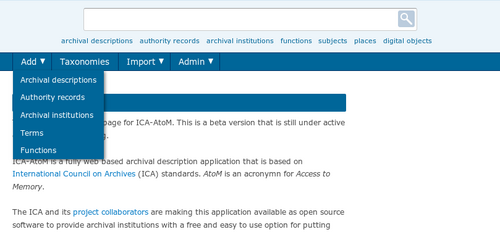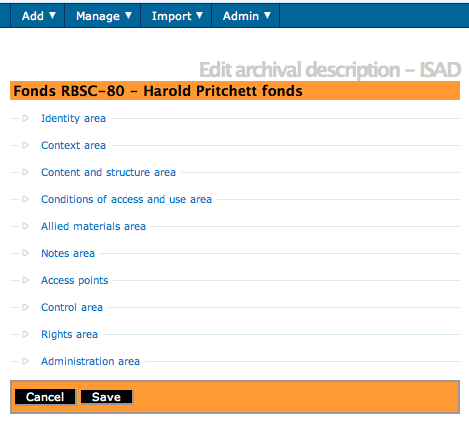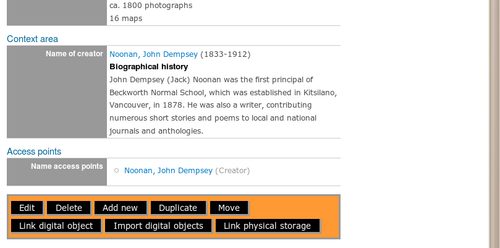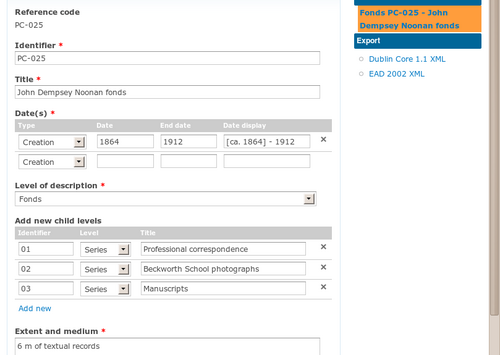Difference between revisions of "Add a new archival description"
Jump to navigation
Jump to search
| Line 16: | Line 16: | ||
<div class="note"> | <div class="note"> | ||
| − | The default status of a newly created archival description is DEFAULT. Under the Administration area users with publication privileges can select PUBLISH as the new status of the archival description, making it available for read access to the public. [ | + | The default status of a newly created archival description is DEFAULT. Under the Administration area users with publication privileges can select PUBLISH as the new status of the archival description, making it available for read access to the public. [File:ArchDescPublish.png|right|thumb|500px| Default draft, Select publish] |
== Add a new child description == | == Add a new child description == | ||
Revision as of 13:48, 16 February 2012
Please note that ICA-AtoM is no longer actively supported by Artefactual Systems.
Visit https://www.accesstomemory.org for information about AtoM, the currently supported version.
Main Page > User manual > Add/edit content > Add/edit archival descriptions > Create a new archival description
Add a new top level description
- In the main menu, hover your cursor over the "Add" menu.
- Select "Archival descriptions" from the drop-down menu.
- ICA-AtoM takes you to a blank edit page for data entry.
- On loading, the edit page displays the record with all information areas closed; click on an information area to access the fields grouped under it. Enter data as required.
- You can quit the create process at any time by clicking the "Cancel" button in the button block; no new record will be created.
- Click the "Create" button in the button block to save the new record.
The default status of a newly created archival description is DEFAULT. Under the Administration area users with publication privileges can select PUBLISH as the new status of the archival description, making it available for read access to the public. [File:ArchDescPublish.png|right|thumb|500px| Default draft, Select publish]
Add a new child description
Create new child records in one of two ways:
- In the archival description view page, click the "Add new" button in the button block; this will create a new description that is one level of description below the description currently in the view page. When the record is saved, you will be able to see the new child records in the context menu. Navigate to the descriptions to add data as needed.
- In the archival description edit page, in the identity information area, enter the relevant data under "Add new child levels". Note that you can add as many levels as needed at one time; for example, to add multiple series to a fonds or collection, fill in the fields and add as many series as desired. When the record is saved, you will be able to see the new child records in the context menu. From within the context menu, logged-in users with permission can re-arrange child level descriptions (e.g., Series, Files, Items) within the Fonds treeview by simply dragging and dropping the selected resources.
- Navigate to the descriptions to add data as needed.
Duplicate an existing description
- At the bottom of the archival description edit page click the duplicate button in the button block to make a duplicate archival description.
- The user is directed to a new screen and can edit the duplicate archival description, which is an exact duplicate of the original archival description. Before starting the edit page provides a warning.
- After editing the duplicate archival description, the user can cancel or save the changes.
- Saving the changes creates a new archival description.





